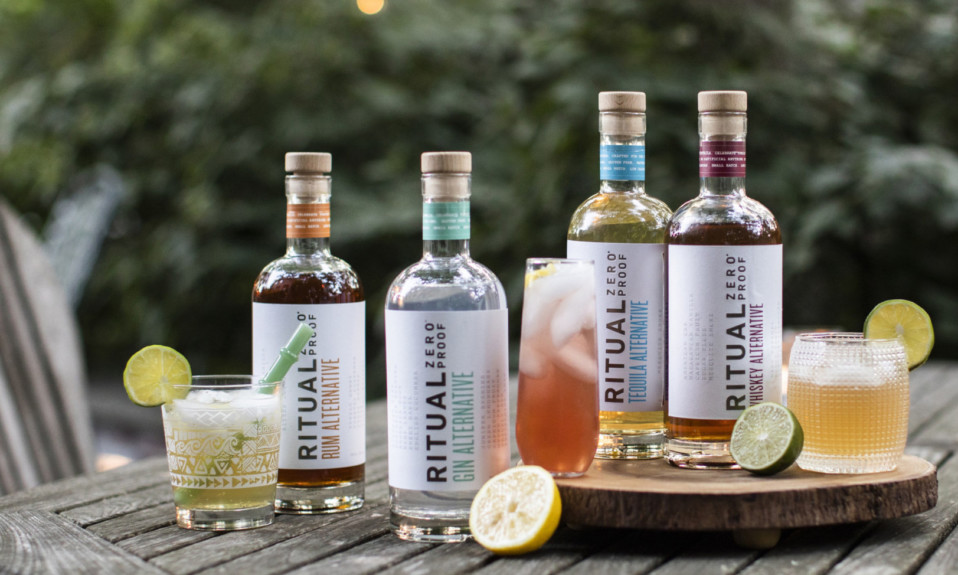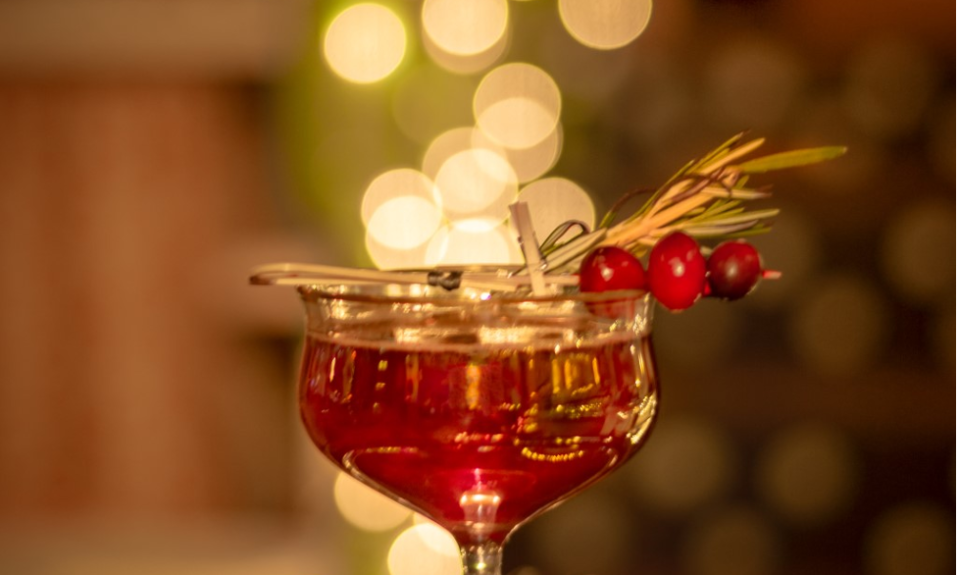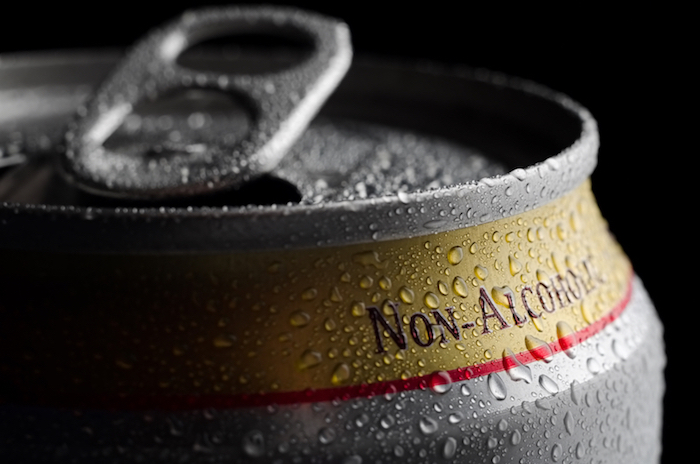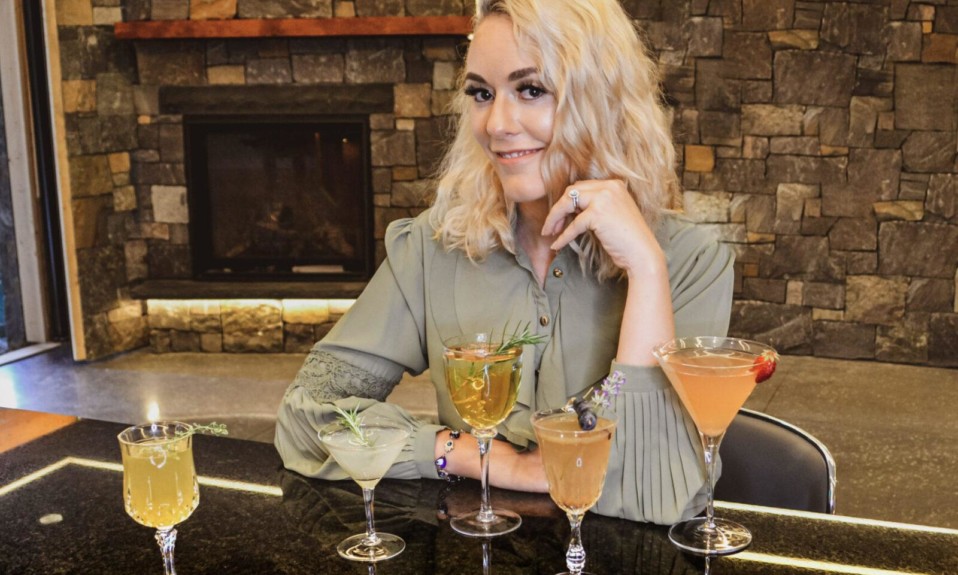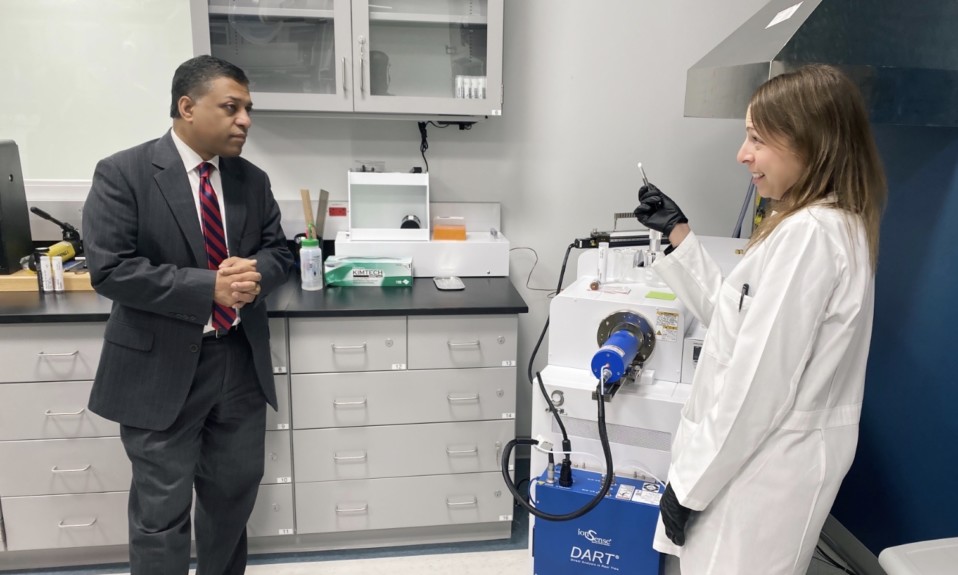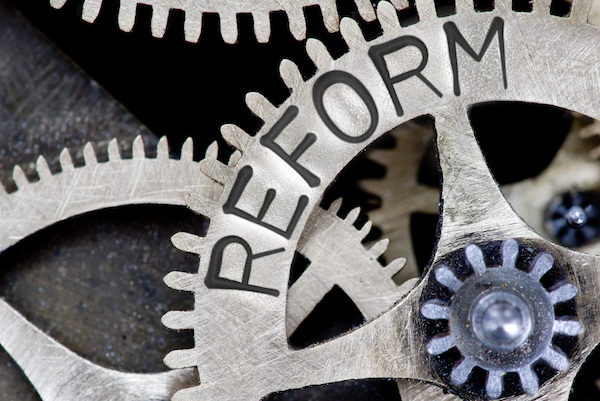Bestselling author Marcus Sakey says his Ritual-brand non-alcoholic spirits give mindful-drinking consumers the “superpower” of choice
By Jennifer Taylor
If anyone understands the importance of coherency, it’s a crime novelist. So it was no surprise when bestselling author Marcus Sakey took a moment before our phone conversation in the midst of Dry January to spell out precisely where he stands on his entrepreneurial endeavor, Ritual Zero Proof, a fast-growing startup for non-alcohol liquor alternatives.
“We love the notion of being helpful to anyone who is sober, but we’re so leery of ever being a trigger for anyone,” he says.
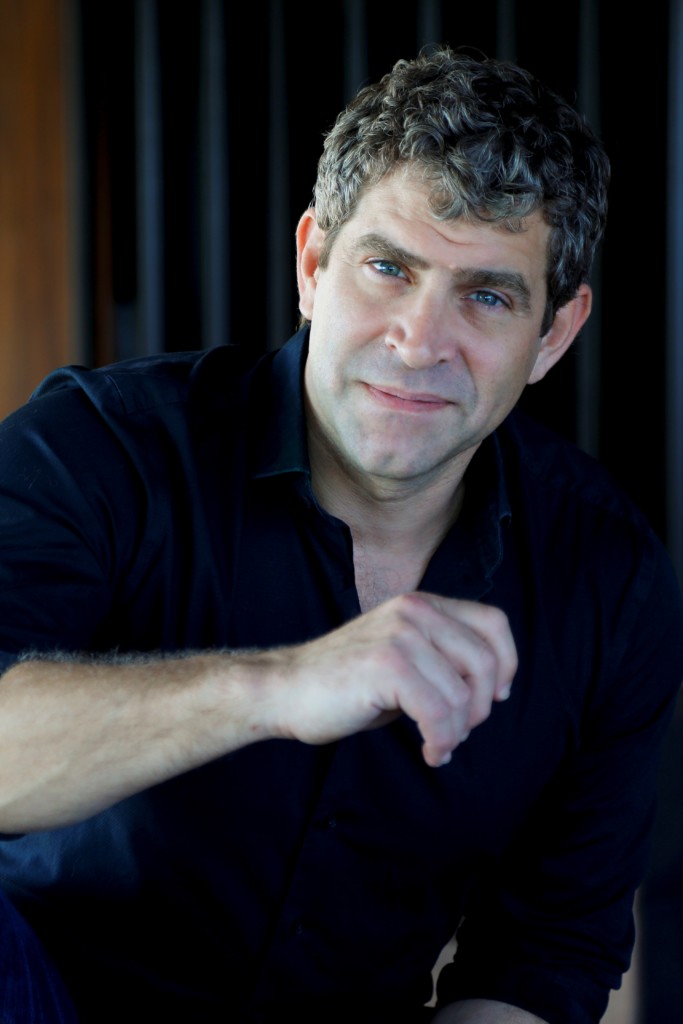
Sakey notes that he drinks alcohol, and he takes great care in not explicitly marketing to the recovery community. Ritual’s products, created out of his need to find balance in his own life, are for people who are looking for a choice that best suits them, whether that’s for the moment or for their lifestyle.
Founded in 2018, Ritual has created alternatives to tequila—think a margarita that mimics the bite without the buzz—as well as rum, whiskey and gin. And sales have exploded. That success is another illustration that a segment of adult society is looking for sophisticated drink alternatives in restaurants, bars or for those celebrated—or ritual—moments at home. Ritual Zero Proof was recently added to the shelves of 450 Whole Foods markets.
So when it comes to talking about his products, language, context and purpose matter to Sakey. For him, Ritual is for “mindful drinking” people. He’s been told by some in recovery that they can’t even take a whiff of his products for fear of a setback. For others, Ritual Zero Proof brings people who prefer to remain sober comfortably back into social circles, without judgment. The one constant about Ritual, Sakey told TreatmentMagazine.com, is that it gives consumers choice. And that, to him, is a superpower.
Q: You are an accomplished bestselling author. I’m curious about how you made the leap from writing thrillers to creating “non-alcohol liquor replacements”? I haven’t seen that before.
A: It was a surprise to me too, honestly. I have a marketing and advertising background. I left that industry to write novels, which was my passion. I did that for, well, nine published books. But around 2017, ’18, I took a conscious break from spirits myself. It was mostly just a matter of being in my 40s with an energetic kid, and just wanting to be a little more mindful. And in that period of taking a break, I realized that an awful lot of what I missed was everything around a drink—mixing the drinks or sitting down with something, having a cocktail and a book. And I was wondering if there was a way I could replicate those parts of the experience without the alcohol—if I could really manage to convey the ritual of having a drink. Hence the name.
So I went into the kitchen and started playing and made a pretty [rough] first draft of a spirit alternative. But it was enough to prove to myself and to my wife and best friends (my two business partners) that this was a viable notion. From there we worked with some of the best distillers, mixologists and flavorists in the business. It took more than a year and more than 500 iterations to perfect the recipe.
Q: What did that experiment in your kitchen look like? Can you describe that?
A: Yeah. I love cooking. I’m a passionate amateur. It was trying to find elements that typify the flavor of the spirits. Like, without the bite of tequila, you can’t make a margarita. So it was playing with various kinds of hot pepper and various herbs and spices that were in line with whiskey and gin. I’ll be honest—they were awful. [But] I found there was enough there that I could see that it could get to something great. And from there we moved on to others. It was literally just me and my knife, cutting board, a pot and pan, going to work.
“I like creating things. And I think the process of writing a book teaches you that there really isn’t anything magical to making something new. There is just doing it and then knowing the first will be terrible. But you make it a little better with each draft or each recipe.”
—Marcus Sakey, founder, Ritual Zero Proof
Q: You said you decided to take a break from alcohol. What was that like for you?
A: It was difficult at first, as much out of habit as anything else. And that’s really where a lot of the ritual came down to. It isn’t the lifestyle that I pursue. I’m not sober. But I do try to be mindful with my consumption. And that’s really what I wanted to achieve through it. It was a forced pause that let me reframe and make active decisions about whether I wanted to drink or not, instead of just pouring one out of habit. It’s very, very different than the case for a lot of those who are sober. And that’s part of why I’m so respectful of it. Everyone’s got their own journey. For me, taking that time, it was the trappings around it that I missed. And it’s that way of marking an occasion, marking a moment. Like sitting down with a book by the fire, having a sophisticated, adult cocktail that elevates it. But that doesn’t mean I wanted the alcohol or the calories. I really just wanted to mark the moment.
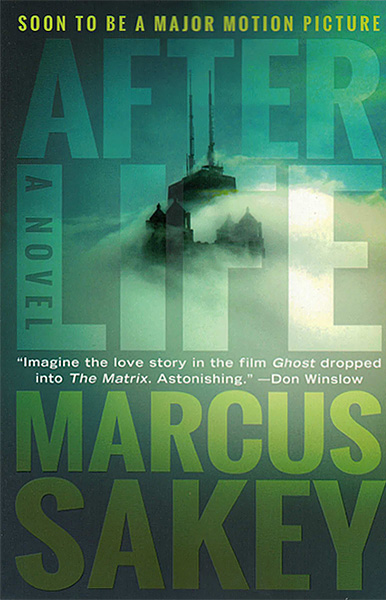
Q: What is the common connection between your work as a novelist and your non-alcohol liquors?
A: Well, it would be easy to make a joke and say writers drink too much. But I don’t really think that’s it. There were certain things, like the fact that I work from home and I work independently as a novelist, that made it easy to pour cocktails or open a beer without thinking. As far as connecting to creating Ritual, I like making things. I like creating things. And I think the process of writing a book teaches you that there really isn’t anything magical to making something new. There is just doing it and then knowing the first will be terrible. But you make it a little better with each draft or each recipe.
Q: What was it like building the product?
A: It’s a funny experience. We were working with real professionals in the space—master distillers, master flavorists, people who do this for a living and who are used to doing things like developing a juice or flavoring a liquor or aging a whiskey. What we were trying to do was take a little bit of each of those skills to create something that wasn’t on the market yet. We very quickly realized that what we wanted was something that wasn’t just tasty, but that as closely as possible replicated the traditional sphere of flavors—gin, whiskey, tequila and rum. We wanted to be able to make a margarita or gin and tonic. I love playing in the kitchen, and there are a lot of really interesting beverage options out there now that I enjoy. But you can’t make an Old Fashioned. And that’s what we wanted.
“I’ve spoken to people in the sober community who love being able to make a cocktail again. I’ve spoken to others who were made nervous by it; people who didn’t want to smell it because it smells too much like spirits. More power to them. Whatever is right for them is what we want at Ritual.”
—Marcus Sakey
So we built it from there, and we’re trying to parse out the individual flavor notes of each of these spirits and explore the ways to echo them at least. It’s a rabbit hole, honestly. We’re bringing in cinnamon from three different countries to taste them against each other and against the other things. It’s a real lesson in what’s involved in making something like this. And then keeping our eye on the goal: to make it as close as possible. We wanted it to have a bite, so you could mix it. We wanted to be able to fool people. And in a mixed drink, I think Ritual can.
I think it’s also part of the reason why I’m so, so very conscious about not wanting to be a trigger. I’ve spoken to people in the sober community who love being able to make a cocktail again. I’ve spoken to others who were made nervous by it; people who didn’t want to smell it because it smells too much like spirits. More power to them. Whatever is right for them is what we want at Ritual.
Q: Give me an example of a day in your life right now, how you balance it with your novels, or are you still separating the two?
A: I still am separating the two, and I’m still writing, albeit at a much slower pace. Ritual’s growth has been just incredibly exciting. I think our timing was very, very good. And I think in truth, the product, once we had it, it was like everyone had always wanted it. No one had ever made it. No one had ever said it before. We went from selling our very first bottles online and in a few local bottle shops in September, October of 2019 to selling them by the pallet and truckload in 2020. Our sales were just more than doubling every year, and it’s just because there’s a real appetite.
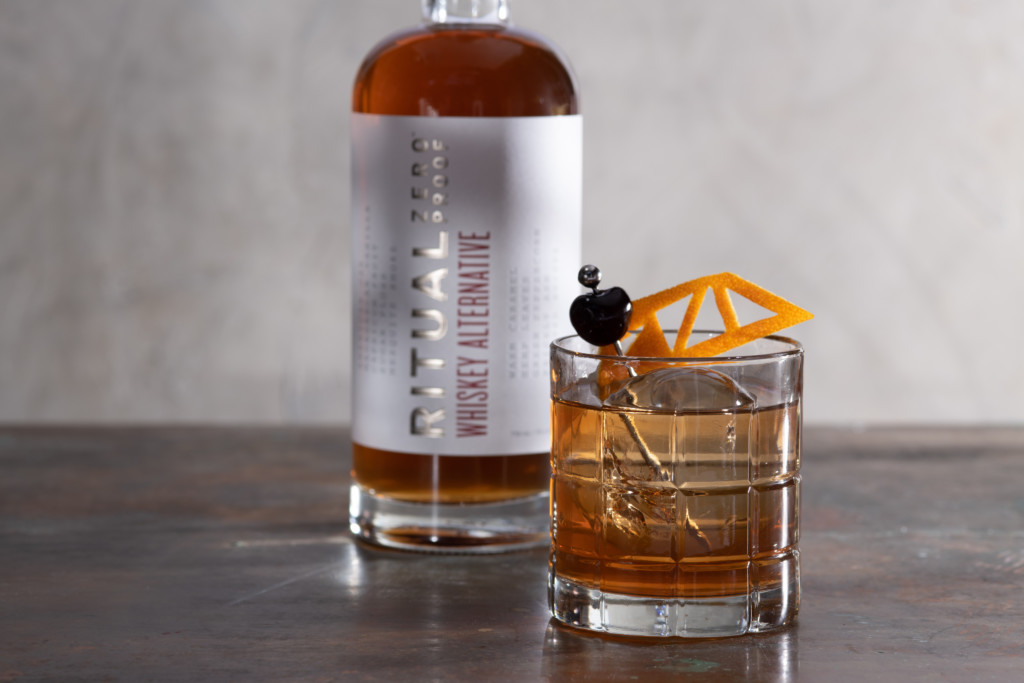
It’s much like oat milk, or meat alternatives—people want the choice. They want to have balance. There’s a recent study that [says] 95% of people who buy dairy and meat alternatives are not vegetarian or vegan, which means that they are often for it for moral reasons or balance reasons, or for just a sense of having it the way they want it. And that’s the purpose Ritual is best suited for—the 52% of America that says they’d like to drink less.
Q: What has happened in the last five to seven years that has caused this to explode? Why now? Why did it take so long?
A: I can only give you my perspective, and I’m not an expert on it. I think it has to do with the overall rise in the expectation of choice with consumers across the last decade. I mean, if you think about grocery stores 20 years ago versus a grocery store today, how many more sections there are and products within those sections, whether it’s things like gluten-free or organic or dairy alternatives, on and on. It used to be Pepsi or Coke. Now there’s Kambucha and green tea with ginger. So I think as consumer expectation of choice has grown, that’s opened up the opportunity for companies like mine, and for people to think, Wait a second, do I actually want a buzz right now? Or do I just want something more interesting than sparkling water?
Q: How do you track where society is in this particular market? Obviously, you can see it through your own sales. But are there other indicators you monitor that show people are starting to get the message and that this segment is growing?
A: Very much so. Sales are obviously the dependable baseline. They are the true proof point. But as fast as we’ve grown, we still have only a tiny fraction of the addressable market. We’re moving into retail, debuting in about 450 Whole Foods right now, rolling into traditional grocery stores as well as liquor stores.
In terms of knowing the market, the better thing is actually talking to people on social [media]. Everything social has been really helpful. We engage directly with our customers, with people in the mindful drinking community, in the cocktail community [and] in the food and beverage community. We’re out there talking to them, because we really want to make a product for anyone. And we want to hear what they like and don’t like.
And then in terms of tracking it, honestly, it’s more tonal across time. When the product very first came out, we had a wave of trolls. Everybody just made jokes: “Why would I want alcohol without the buzz?” Why, why why? Well, there’s an easy answer to that. There’s a dozen easy answers to that for any individual—whether you’ve had two and want to downshift, whether you’re living completely sober, whether you’ve got to work out tomorrow, or you’re pregnant, or trying to lose weight, or whatever reason is your reason, Ritual is there to help. So seeing that tone change across time from really snarky and aggressive to people understanding that it may not be relevant for them, or not relevant for them today, but it will be at some point.
Q: How do you feel about the culture of drinking alcohol? You’re talking about some of the trolls that you’ve encountered. One of the last interviews I did on this topic, an entrepreneur said they just want to be able to go out there and socialize and be part of the group and not have anybody judge them one way or another.
A: I think it’s a problem in our society. Our society’s relationship to alcohol and the casual pressure around it is problematic. Now, I say that as someone who’s not sober. But it is unfair that there was nothing you could have but sparkling water, unreasonable that you were calling attention to yourself, and to shorten your own experience. But I think there’s a fun flipside to it, too. With spirit alternatives in particular, it can be a superpower. You can be the one at the office party—you’re still holding a martini glass, but you’re holding your thoughts and holding your own. You can choose it because you know you have a morning meeting and you still want to go out and hang out with your friends. While there are real cultural issues with the prevalence of alcohol, the sort of depression around alcohol, I think that’s changing, and it’s changing fast. And we’re really proud to be part of it.
Q: Tell me about the process and where it all happens, like physically, right now. I assume it is not in your kitchen any longer.
A: It is not in my kitchen anymore, thank the Lord. The idea was born in Chicago, and the company is run out of Chicago, although our team spans the country. Recipes are perfected primarily in Kentucky, which is, of course, the home of many a master distiller. We’re bottled in St. Louis. And we are sold all over the United States, both in retail [and in e-commerce]. E-commerce has been very helpful during the pandemic, but retail has always been where we’ve been aiming. It’s really exciting to be moving into grocery stores.
Q: So we are still slogging through the pandemic, right? Can you speak to what your sales have been like during this muddled-up time? I suppose, during lockdown, this might have been a very scary time for you and the company.
A: It was a scary time for all of us. But we were an extremely young product at that time. The interesting thing is that during the pandemic, both the market for spirit alternatives and the market for spirits grew dramatically. I think it’s a mystery to the situation to think that the pandemic and interest in health prompted a focus on spirit alternatives. What it did for us, though, was because we’re non-alcoholic, we could sell direct-to-consumer, or we could sell through our website through Amazon without the restrictions that we would have faced if we were a liquor brand. That let us stay in business and build a really strong, large, loyal following. And really get to know them. It let us refine our products and learn about our audience. And as the most restrictive part of the pandemic faded away, we started to meet them where they lived, in the grocery store.
Q: Can you speak, generally, to the sober curious movement and where Ritual Zero Proof fits in?
A: I’ve never really liked the term “sober curious” because, personally, it’s a little belittling of the personal commitment involved in choosing to drink less. I’d like something like “mindful drinking,” whether that means sober or not. I have been thrilled to see it growing so dramatically, and acceptance growing so dramatically. My wife made a joke early on in the company that it used to be if a woman ordered sparkling water, everyone assumed she was pregnant. That’s just not the case anymore. Now, it might just mean that you’re being mindful.
“I have respect across the board. If we are helpful to someone, that’s thrilling to me. If you even think it might not be the right thing, please don’t buy my product.”
—Marcus Sakey
We’re also really excited to see the growth of this into other spaces. For example, we have a partnership with Hyatt Hospitality Group to add our products to a number of their high-end hotels, partly because they wanted to get ahead and wanted to be conscious of the needs of the people staying there. But also the staff in the service industry, traditionally, often faces a really hard time with substance [use]. We’re in partnership with a company called Sunnyside, which is a mindful drinking SMS-based service. I love them [and their] really smart, non-judgmental approach to help people decide to drink more consciously, to consume more consciously. To partner with someone like that and provide a product like this, and to see the demand for both of us just explode, tells me that this isn’t a blip.
Q: Can you speak to people in recovery and where Ritual Zero Proof fits in?
A: I need to start by saying that I am not sober or in recovery. And so anything I say here is just the attempted respectful opinion of someone who’s not in those communities. I would say that in talking to people who are in recovery, or who are sober, even if they’re not in recovery, it’s a very personal choice. For some people, they found non-alcoholic beers and spirit alternatives a godsend. It lets them feel like they can be at the party without risking what they worked hard for. Others I’ve spoken to won’t open the bottle, because we worked really hard to make it smell like the real thing, and they just don’t want to risk that level of exposure. I have respect across the board. If we are helpful to someone, that’s thrilling to me. If you even think it might not be the right thing, please don’t buy my product.
Q: I want to touch on the language. I’ve noticed that the language is very individualized. As a writer, how did you settle on the term “mindful”?
A: It describes the way I wanted to consume alcohol and the way I thought our ideal customer wanted to have a relationship with alcohol. The notion of calling it “sober curious” sounds cheesy or demeaning. It sounds like something you flirt with but don’t do. If you have a problem, saying “sober curious” would be downright offensive. I just think it’s very, very, very different. The same way there’s a difference between being sober and being in recovery—at least there’s a nuance between those two or a level difference between the two. So for me, “mindful drinking” means just that—thinking about it before I pour it. It means that I am recognizing the times when I want to engage with a cocktail and the times when I just want something in my hand.
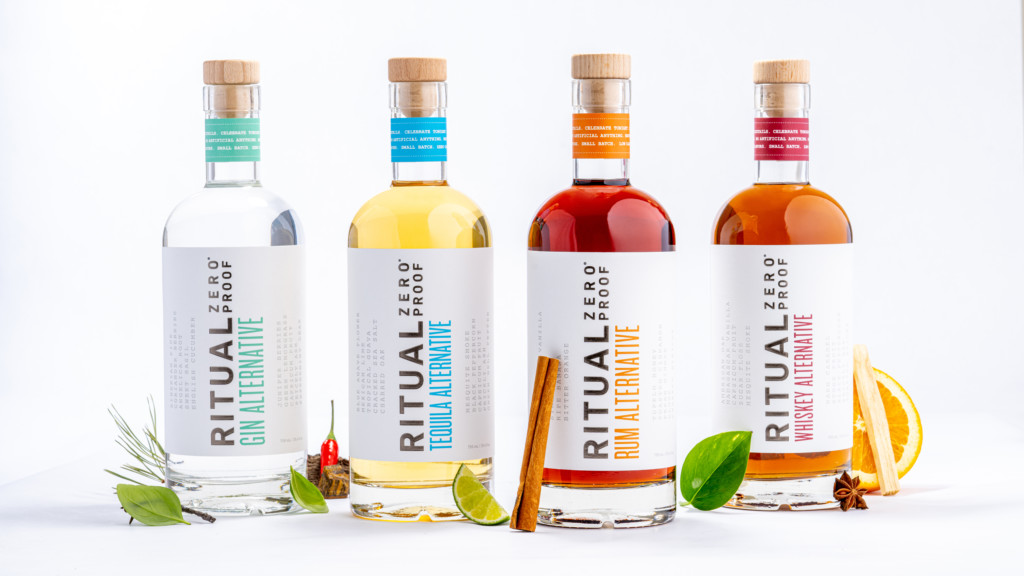
Q: What has been the most surprising aspect of this experience for you?
A: The incredible speed of growth, quite honestly. We really believed in the product from the beginning, but we thought we would have faced a much harder battle to win hearts and minds on it. I think the truth is everybody was waiting for it to exist. That’s evident in our sales, but it’s also evident in the rise of sober spaces and dry bars. It’s evident in the huge number of competitors that have come up since we’ve launched.
Q: Last question: What is your outlook for the future?
A: I think the category is unquestionably here to stay. I think that in a couple of years, it will be so widely accepted, in the same way that there are dairy alternatives in every dairy case in every grocery store in America. You will see the same thing with spirit alternatives and non-alcohol beer. It’s simply a common need that the customers want.


